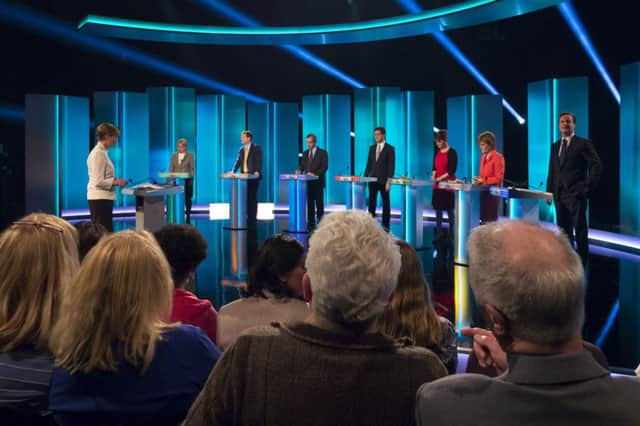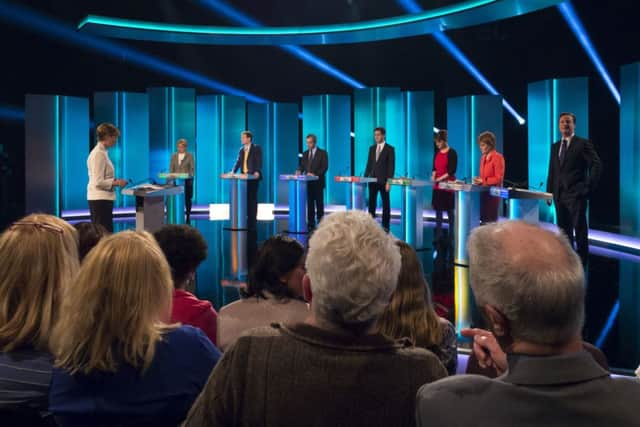Election 2015 debate: Nicola Sturgeon judged winner


An average of three snap polls conducted in the immediate aftermath of a debate that focused on David Cameron’s economic record, the NHS and immigration, put the SNP leader just ahead of the Prime Minister and Labour’s Ed Miliband.
When results from ComRes, ICM and YouGov polls were combined, Ms Sturgeon was the top performer for 21.7 per cent of those sampled, followed by Mr Cameron on 21 per cent and Mr Miliband on 20.3 per cent.
Advertisement
Hide AdAdvertisement
Hide AdUkip’s Nigel Farage polled 20 per cent, despite controversy over his comments that the British NHS spent too much treating foreign nationals with HIV.


Lib Dem leader Nick Clegg trailed on just 9.3 per cent, despite performing well.
In a tense atmosphere, the seven leaders gathered in the ITV studio in Salford to spar with one another in the first official week of the election campaign.
With five weeks to go in the closest and most uncertain general election in decades, each hoped to land a blow that would transform their party’s campaign, with the polls showing the Tories and Labour neck and neck in the UK and the SNP on the verge of sweeping Labour and the Lib Dems away in Scotland.
This was the only occasion on which Mr Cameron and Mr Miliband, the two men vying to be prime minister, will have debated together on the same platform.
However, in what was described as “a new politics”, they were joined by Ms Sturgeon, Plaid’s Leanne Wood, Green leader Natalie Bennett, Mr Farage and Mr Clegg.
The debate happened only after weeks of wrangling, with many accusing the Prime Minister of being “a chicken” and wanting to avoid any direct contest with Mr Miliband.
A head-to-head Channel 4 debate was changed to consecutive interviews, and Mr Cameron agreed to last night’s event only because it fell before Easter.
Advertisement
Hide AdAdvertisement
Hide AdHe complained that the 2010 TV debates featuring himself, Mr Clegg and Gordon Brown had “sucked the life out of the election campaign” and insisted the main campaign needed to be free of televised debates.
Last night’s event focused on four audience questions, on the economy, health, immigration and the future of the UK.
Ahead of the debate, a bullish Prime Minister joked he would “throw Nigel Farage on the floor”. However, the Ukip leader went in as the bookies’ favourite to come out on top after twice flooring Mr Clegg in European Parliament election debates.
Mr Miliband, who mimicked Mr Clegg’s performance in 2010 by focusing directly on the camera but appeared to be lacking the energy he showed in the Paxman interviews last week, said he was concerned about the viewers not the six other leaders in the room.
A stifled debate where the leaders appeared to be worried about making a gaffe was briefly brought to life when an audience member interupted Mr Cameron, challenging him about leaving military veterans homeless on the streets.
The Prime Minister said he agreed with her and that was “why supporting veterans charities is important”.
The night kicked off with one-minute statements from the leaders with Ms Bennett going first. She opened with the main theme of the night, that “austerity is not inevitable”.
Advertisement
Hide AdAdvertisement
Hide AdMr Farage’s said the other six leaders were “all the same” because they supported the European Union and were part of the “social democratic consensus”.
Mr Clegg, admitted making mistakes but warned “nobody will win the election” and promised “grit and resilience in finishing the job” with the economy.
Ms Sturgeon held out the hand of “friendship” to the rest of the UK and promised the SNP would bring a change to Westminster, with “more progressive politics”.
The Prime Minister said five years of his government had turned the country around and “cut taxes for 30 million working people.” He insisted the choice in the election was “sticking with plan which was working or going back”.
Mr Miliband said the past five years had seen the country “going backwards”. He told viewers “it doesn’t have to be this way” and promised to “build a future for all our young people”. He said: “Britain can do better”.
The first question was how the deficit could be eliminated without raising taxes or big cuts.
A pale-looking Mr Farage used the question to go on the attack on Scottish funding through the Barnett formula. He said: “Frankly, English and Welsh taxpayers are getting a rough deal.”
Advertisement
Hide AdAdvertisement
Hide AdMs Sturgeon, dressed in a bright red jacket, hit back saying the “canny Scots pay more per head in tax”. She added that she supported a “modest spending increase” to stop austerity “pushing people in poverty”.
The question on the economy brought an immmediate confrontation between the two coalition partners, with Mr Clegg demanding to know why Mr Cameron wanted “to make ideological cuts in schools” and “not ask for a penny more from the wealthy”.
In an early sign of a left-wing consensus against the Prime Minister, Mr Miliband demanded to know why Mr Cameron was not demanding money from tax havens or hedge funds.
But the Prime Minister hit back, saying his Labour opponent “has not learnt from the mistakes of the past”.
Ms Sturgeon said the Tory-led government had missed borrowing targets by £150 billion “while pushing children into poverty”.
Mr Farage questioned why Labour and the SNP “do not think we have a problem with debt”, while Ms Wood insisted the Tories “had been balancing the books on the backs of the poor”.
The Nationalist threat to Labour was underlined when Ms Wood turned on Mr Miliband, accusing his party “of failing Wales, some of the poorest areas in the European Union”.
Ms Sturgeon piled in, telling viewers Labour had joined the Tories to vote for £38 billion of cuts in the past few weeks.
Mr Miliband accused her of getting her facts wrong.
Advertisement
Hide AdAdvertisement
Hide AdHe said SNP plans for fiscal autonomy would “cut £6 billion in Scotland”, adding: “You have got to explain to voters in Scotland what you want to do.”
However, Mr Cameron said all that was needed was a saving of £1 in every £100 over the next two years.
The Prime Minister, who refused to be silent when the presenter tried to cut him short, insisted that the deficit would only go “if we stick to the plan”.
He also raised the letter left in the Treasury after the 2010 election by former Labour chief Treasury secretary Liam Byrne saying: “Sorry we have run out of money.”
As the debate hotted up, Mr Miliband rounded on him, saying: “There you go again, talking about the past. We need to talk about the future.”
He accused the Tories of planning to “slash and burn public services”.
On the second question of the NHS, a tense-looking Ms Sturgeon confirmed that SNP MPs would vote on English health issues to protect Scottish funding and insisted it needed to be protected.
Mr Farage clarified his party’s position by insisting that it does, despite earlier policies, support an NHS that is free at the point of care.
Advertisement
Hide AdAdvertisement
Hide AdAmid claims that “another £8 billion is needed in the NHS” by 2020”, Mr Farage accused his opponents of “political correctness” and said, “We have got to put our own people first”, questioning why £2 billion a year was being lost due to so-called health tourism. He said it was wrong to give HIV drugs worth £25,000 a year to foreigners.
Ms Sturgeon slapped him down, saying: “When I hear of someone with a dreadful illness I think of them as a human being, I don’t ask where they come from.”
On the final question on what can be done for younger people, Mr Clegg took head-on his party’s failure to keep its promise to abolish tuition fees. “They were introduced and jacked up by Labour,” he said. “When we came into office there was no money left, so we did the next best thing and more young people are at university now as a result.”
Not exactly a magnificent seven – how they rated
Nigel Farage. The Ukip leader’s assertion that the NHS spent too much money on treating foreign nationals with the HIV virus attracted opproprium and will perhaps be the moment that this debate is ultimately remembered for. Although early polls last night suggested that his popularity had not been dented.
David Cameron. The Prime Minister put in a decent shift and made much of his administration’s economic record. He looked and sounded serious and will be satisfied enough with his performance. But as the leader defending the government’s record, he was always going to come under sustained attack from all sides. That, perhaps, is why he has proved so reluctant to embrace other televised confrontations.
Ed Miliband. At first, the Labour leader built on his solid performance in the Jeremy Paxman inquisition. Although there were still signs of awkwardness, in the main Miliband gave an assured performance. Nevertheless, his aides will lament that he failed to land a killer blow on Cameron.
Nicola Sturgeon. The SNP leader’s mission was to present herself as someone who would stand up for Scotland while also promising to work within the Westminster system to end austerity.
Nick Clegg. The Lib Dem leader managed to pull off the trick of attacking the record of Cameron, the leader of the government in which he has just stopped serving, and attacking Labour. He also owned up to mistakes including his broken tuition fees promise. It wasn’t Cleggmania, but Clegg again showed he has a knack for these occasions.
Advertisement
Hide AdAdvertisement
Hide AdLeanne Wood. The Plaid Cymru leader won applause as she attacked Farage’s “dangerous” remark on foreign HIV patients.
Natalie Bennett. After her recent car-crash radio interview, the Green leader surpassed expectations and performed reasonably competently.
FOLLOW US
SCOTSMAN TABLET AND MOBILE APPS